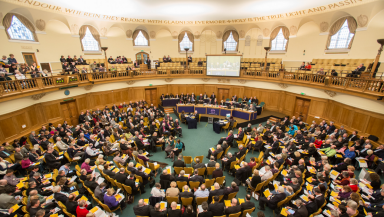
Yesterday, the General Synod of the Church of England passed a motion which encouraged their bishops to commend the long-debated Prayers of Love and Faith and trial standalone services of blessing for same-sex couples.
Rev John Dunnett, National Director of the Church of England Evangelical Council (CEEC) outlined the seriousness of the decision.
"This is, however, more than just a departure from the biblical understanding of sex and marriage. Sadly, today marks a 'watershed' moment, in that it appears that the Church of England no longer sees Scripture as our supreme authority," he said.
It was a close vote, and it has left many in the Church feeling confused and concerned about the future. Given that Christians are called to love the Lord their God with all their heart, soul and strength, it is not surprising that different people are responding in slightly different ways.
On social media and in conversation many have spoken of being heartbroken, of breaking down in tears and of feeling abandoned by the Church they once loved.
Some are still trying to make sense of how the decision has been made, questioning the lawfulness of the decision and echoing those in the debate who called for a better process so a better decision could be made. Rev Andrew Goddard has written at length about some of the legal debates, explaining that "considering questions about legality is not about legalism".
"The Church of England is a church 'established by law', and that means that our canon law is the place where our doctrine is expressed. And the rigour needed to formulate, discuss, and possibly revise these laws provides the needed disciplines for thinking carefully about doctrine without causing unnecessary division."
On his blog, Rev Richard Moy, who was acting as a Chaplain at General Synod, wrote: "Well with tears, and a tearing heart… it's into the desert I say…Into the desert like ancestors of old. The place where religious orders form.A place for those who find themselves in impaired relationship with their bishops and waiting to find what so-called 'pastoral provisions' may be (or may well be not) offered to them in the future."
This sense of being driven out has led some to consider whether they can in conscience remain within the Church of England and the Anglican Network in England reports that clergy and laity are approaching them for assistance.
The big question that hangs in the air, however, is what can be done within the Church of England and many are looking to CEEC for answers. A statement released yesterday suggests they won't have to wait long: "CEEC is committed to supporting the ministry of orthodox evangelical lay people and ministers across the dioceses. In the next few days CEEC will announce a series of provisions for orthodox evangelicals and work to do all it can to ensure evangelical life and witness in the Church of England continues for years to come."













